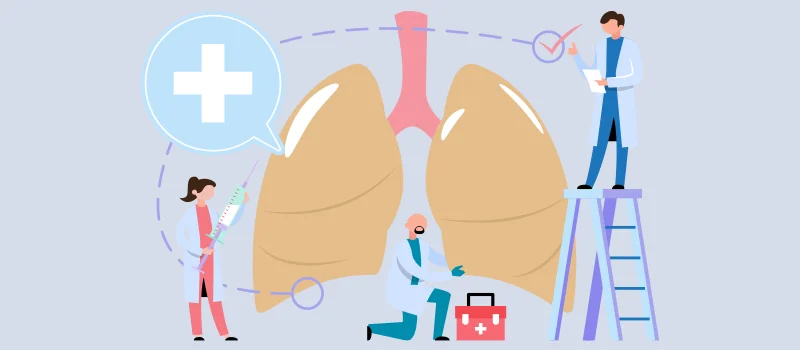Drug Details
Generic Name:
Fluticasone propionate and salmeterol
Common Brands:
Advair Diskus, Advair HFA, AirDuo Respiclick
Availability:
Prescription only
Therapeutic Class:
Inhaled corticosteroid and long-acting beta agonist
Forms:
Inhaler
Administration:
Oral inhalation
Therapeutic Uses:
To treat asthma-related wheezing, coughing, shortness of breath, difficulty breathing, and chest tightness
To treat symptoms associated with chronic obstructive pulmonary disease (COPD)
Controlled Status:
Not a controlled substance
Fluticasone-Salmeterol Drug Class
Fluticasone (floo-tik-ah-sone) belongs to a group of medications called corticosteroids. Salmeterol (sal-meh-tuh-role) belongs to a group of drugs called long-acting beta agonists.
Fluticasone-Salmeterol Age Range
Fluticasone and salmeterol (Advair Diskus) is approved for use in adults and children 4 years of age and above. The Advair HFA and AirDuo Respiclick products are approved for use in adults and children 12 years of age and above.
Uses
Fluticasone-Salmeterol Uses
The combination drug fluticasone-salmeterol is used for asthma control. This medication can treat wheezing, coughing, difficulty breathing, shortness of breath, and chest tightness from asthma. Additionally, this medicine is used to manage and prevent symptoms caused by chronic obstructive pulmonary disease (COPD) (lung conditions that include chronic bronchitis and emphysema).
There may be other uses of fluticasone-salmeterol—your doctor or pharmacist can give you further drug information.
Fluticasone-Salmeterol Mechanism of Action
Fluticasone is a corticosteroid and it reduces inflammation and swelling in the air passages. Salmeterol is a long-acting beta adrenergic agonist that opens up the airways and makes breathing easier.
Fluticasone-Salmeterol Doses
Fluticasone-salmeterol inhalation powder and solution is available as a Diskus inhaler in doses of 100 mcg/50 mcg, 250 mg/50 mcg, and 500 mcg/50 mcg. The HFA inhaler comes in doses of 45 mcg/21 mcg, 115 mcg/21 mcg, and 230 mcg/21 mg. The Respiclick inhaler comes in doses of 55 mcg/14 mcg, 113 mcg/14 mcg, and 232 mcg/14 mcg. The usual dose is 1-2 inhalations (puffs) by mouth once or twice a day as prescribed.
Directions
How To Use Fluticasone-Salmeterol
Fluticasone-salmeterol comes in a special inhaler to be used 1-2 times daily. If your doctor has prescribed the medicine twice daily, use the inhaler morning and evening, with the doses at 12-hour intervals.
Do not exhale or blow into the inhaler. Take it apart, or wash the mouthpiece or any other part of the inhaler. It’s important to keep the inhaler completely dry. Do not use it with a spacer.
Your doctor, pharmacist, or respiratory therapist will show you the proper use of the inhaler. You can also refer to the patient information leaflet, instructions, and diagrams that came with the inhaler. Ask your healthcare providers to explain anything you do not understand.
Read the medicine label carefully and take it exactly as advised. Do not increase or decrease the dose or change the dosing frequency. Do not use fluticasone-salmeterol to treat sudden asthma symptoms or a severe asthma attack. Your doctor will prescribe a short-acting rescue inhaler for such situations.
If you were previously on a short-acting beta agonist inhaler, for example, albuterol (brand names Ventolin, Proventil), your doctor will likely tell you to stop using this medicine on a regular basis and only use it as a rescue inhaler after starting fluticasone-salmeterol.
It may take a week or more for you to get the full benefits of your fluticasone-salmeterol inhaler. This medication combination will control your symptoms, improve lung function, and help to reduce asthma severity, but it will not cure the underlying condition. Continue using the inhaler even in the absence of any symptoms. Do not stop using it without discussing it with your doctor. If you stop using the medicine, your asthma symptoms may get worse.
Missed dose: If you miss a dose of fluticasone-salmeterol, take it as soon as you remember. If it is almost time for your next dose, skip the missed dose and take the next dose according to your regular dosing schedule. Do not take a second dose or extra medicine to make up for a missed dose.
Storage: Store fluticasone-salmeterol at room temperature (between 15-30° C or 59-86° F) away from moisture, heat, and direct light in a tightly closed container. Do not store medications in the bathroom where they can be exposed to moisture and heat. Keep all medications safely out of reach of children and pets.
Unused medicine: Unused fluticasone-salmeterol should be disposed of in a way that children, other people, and pets cannot get to them. Do not throw fluticasone-salmeterol in the trash or flush it down the toilet. The best way to properly discard expired or unneeded fluticasone-salmeterol is through a drug take-back program or your local waste disposal company. Learn more about proper medication disposal.
NOTE: This medication guide is a summary and may not contain all possible drug information on fluticasone-salmeterol. The information contained here may not be up-to-date. This sheet is for information purposes only. If you have questions about fluticasone-salmeterol, talk to your doctor or pharmacist for medical advice.

Discounted prices for fluticasone-salmeterol
start at $114.21.
Get your FREE BuzzRx card and
start saving today!
Side Effects
Fluticasone-Salmeterol Side Effects
Possible side effects of fluticasone-salmeterol are listed below. Call your doctor for medical advice if they are severe or last more than a few days.
- Sneezing and/or runny nose
- Throat irritation and/or sore throat
- Headache
- Sinus pain
- Stomach pain, nausea, vomiting, diarrhea
- Muscle pain or bone pain
- Tooth pain
- Weakness and/or fatigue
- Dizziness
- Excessive sweating
- Uncontrolled shaking
- Sleep difficulties
Fluticasone-salmeterol can also cause more serious side effects and allergic reactions. Call your doctor right away or seek emergency medical attention if the following effects occur:
- Skin rash, hives, itching (allergic reaction)
- Swelling in the eyes, face, lips, tongue, throat, hands, lower legs, ankles, or feet
- Worsening wheezing, coughing, or chest tightness after inhaling fluticasone-salmeterol
- Noisy breathing
- Chest pain
- Pounding or irregular heartbeat
- Choking or difficulty swallowing
- Hoarseness
- White patches inside your mouth
- Tingling or burning in the hands or feet
- Fainting
- Fever, chills, or other signs of an upper respiratory tract infection
The above list may not include all the potential side effects of fluticasone-salmeterol. Contact your healthcare provider if your side effects are unusual or severe or they do not get better over time. You can also report unusual side effects to the Food and Drug Administration at 1-800-FDA-1088.
Fluticasone-salmeterol Overdose: In case of an overdose of fluticasone-salmeterol, call your doctor immediately. You can also call your local poison control center, provincial poison control center, or the national poison control center at 1-800-222-1222. Call 911 or emergency services if a person has collapsed, cannot breathe, has had a seizure, or cannot be awakened. Signs and symptoms of an overdose may include convulsions, chest pain, a fast, pounding or irregular heartbeat, headache, dizziness, fainting, blurred vision, nervousness, uncontrolled shaking, muscle weakness, muscle cramps, nausea, fatigue, lack of energy, dry mouth, and sleep difficulties.
Warnings
Fluticasone-Salmeterol Risks, Warnings, and Complications
Fluticasone-salmeterol may cause or worsen health problems in some people. Talk to your doctor or pharmacist about other treatments for asthma and chronic obstructive pulmonary disease if you are at an increased risk of adverse reactions or complications from this medication. Some of the risks of taking fluticasone-salmeterol include the following:
|
Precautions Before Starting Fluticasone-Salmeterol
Tell your doctor if you have ever had an allergic reaction to fluticasone (Flovent, Flonase), salmeterol (Serevent), milk proteins or other foods, any of the active or inactive substances in fluticasone-salmeterol inhalers, or any other medications. Your pharmacy can give you a list of ingredients.
Tell your doctor and pharmacist all the medications you are taking, including prescription medications, over-the-counter medicines, vitamins, supplements, and herbal remedies. This can help avoid possible interactions between your medications.
Inform your doctor if you are taking another LABA, such as salmeterol alone (Serevent) or formoterol (Perforomist, in Symbicort, in Dulera). Taking fluticasone-salmeterol with other LABAs is not recommended due to the risk of overdose. Your doctor will tell you which medications to continue and which ones to stop. Follow these instructions carefully.
Give your doctor a complete medical history. Fluticasone-salmeterol may not be right for people with certain medical conditions such as osteoporosis (weak bones), irregular heartbeat, high blood pressure, heart disease, liver disease, diabetes, hyperthyroidism (overactive thyroid), seizures, tuberculosis (TB), eye conditions such as cataracts or glaucoma, and conditions affecting the immune system.
Also, tell your doctor if you have never had measles or chickenpox and have not been immunized for protection against these infections. Avoid sick contact and especially stay away from people with chickenpox or measles. If you get exposed to anyone who has one of these infections or if you develop any symptoms, inform your doctor without delay.
Ask your doctor if it is okay to eat grapefruit and drink grapefruit juice while on this medicine.
Tell your health care professional if you are pregnant, could be pregnant, plan to get pregnant, or are nursing an infant with breast milk.
Precautions During Use of Fluticasone-Salmeterol
Doctors may want to change the dose based on asthma control and monitor patients for serious adverse effects during fluticasone-salmeterol treatment. Take your medication regularly as prescribed. Keep all your medical and lab appointments.
Call your doctor if you become pregnant while taking fluticasone-salmeterol.
Tell all your doctors you are on fluticasone-salmeterol, especially before any surgery, including dental procedures.
Fluticasone-Salmeterol Drug Interactions
Other drugs can affect how fluticasone and salmeterol work. Possible drug interactions with other medicines can increase the risk of severe adverse reactions. The following medications can have interactions with fluticasone-salmeterol:
- Other medications used to treat asthma and COPD
- Beta-blockers such as labetalol (Trandate), propranolol (Inderal), metoprolol (Lopressor, Toprol XL), atenolol (Tenormin), and nadolol (Corgard)
- Diuretics or water pills
- Certain antifungals such as ketoconazole and itraconazole (Sporanox, Onmel)
- Antibiotics such as clarithromycin (Biaxin, in Prevpac) and metronidazole (Flagyl)
- HIV drugs such as indinavir (Crixivan), atazanavir (Reyataz), ritonavir (Norvir), nelfinavir (Viracept), and saquinavir (Invirase)
- Anti-seizure medications
- Antidepressants such as nefazodone
Also tell your doctor and pharmacist if you are currently taking or have taken the following medications in the past 2 weeks:
- Tricyclic antidepressants such as amoxapine, amitriptyline, clomipramine (Anafranil), doxepin (Silenor), desipramine (Norpramin), nortriptyline (Pamelor), imipramine (Tofranil), trimipramine (Surmontil) and protriptyline (Vivactil)
- Monoamine oxidase (MAO) inhibitors such as phenelzine (Nardil), linezolid (Zyvox), isocarboxazid (Marplan), selegiline (Eldepryl, Emsam, Zelapar), methylene blue, and tranylcypromine (Parnate)
Give your doctor or pharmacist a complete list of your medications, including prescription drugs, nonprescription drugs, dietary supplements, and herbal remedies. Also, tell your healthcare professional if you smoke, drink alcohol, or use recreational drugs because some of these substances can cause serious health complications when used with prescription medications.
Pros & Cons
Fluticasone-Salmeterol Pros and Cons
- Fluticasone-salmeterol can effectively treat asthma and COPD.
- It is safe for use in children 4 years and older (Advair Diskus).
- This inhaler contains two drugs and offers convenience of use.
- Fluticasone-salmeterol can be used for maintenance therapy to prevent symptoms of asthma, but it cannot treat a severe asthma attack.
- It takes a week or more for this medicine to start working.
- The inhaled corticosteroid can cause oral thrush.
- The Advair Diskus and AirDuo Respiclick products contain milk proteins and are not suitable for people with milk allergies.
- Combined fluticasone-salmeterol is expensive, even though generic versions are available.
Pharmacist Tips
Fluticasone-Salmeterol Tips from Pharmacists
Do not wash or wet the inhaler, take it apart, or exhale into it. Store it in a horizontal position.
The first time you use the inhaler or if it has been more than a month since you last used it, prime the inhaler before use. You can do this by shaking the inhaler and spraying 2-4 puffs into the air.
Use fluticasone-salmeterol daily as prescribed. Do not skip doses and do not stop taking the medicine without talking to your doctor.
Fluticasone-salmeterol is not for acute asthma episodes. Use your rescue inhaler for a severe asthma attack.
Rinse your mouth after using this inhaler. It contains an inhaled corticosteroid which can cause oral thrush (a fungal infection).
Rx Savings Tips
Fluticasone-Salmeterol Rx Savings Tips
Fluticasone-salmeterol is a generic medication and is available at significantly lower prices than the brand names. Brand names Advair Diskus, Advair HFA, and AirDuo Respiclick, and generic fluticasone-salmeterol contain the same medicine and are equally effective and safe. Like with most medications, the generic version offers better value. A BuzzRx fluticasone-salmeterol coupon can result in big savings on the drug. With a BuzzRx discount card, savings card, or discount coupons, the medication could cost you a fraction of retail prices. Fluticasone-salmeterol may be under $114.50 for 60 blister with inhalation device of the 250 mcg - 50 mcg dose at Walmart, Walgreens, Rite Aid, CVS Pharmacy, and other participating pharmacies with a BuzzRx discount card or free coupon. For the biggest discounts on fluticasone-salmeterol, give the checkout clerk your BuzzRx fluticasone-salmeterol discount coupon when you drop off your prescriptions.
Lowest Price for Fluticasone-Salmeterol | |
| Brand $407.66 | Generic $114.21 |
VIEW DISCOUNTS Pricing based on most commonly-filled versions. Select the strength and quantity of your medication for the most accurate pricing. | |
Common Questions
Common Questions about Fluticasone-Salmeterol
Can I use fluticasone-salmeterol with other inhalers to treat asthma?You can use fluticasone-salmeterol with some other inhalers to treat asthma, but not all. Your healthcare provider will tell you which medications to continue and which ones to stop. They will tell you which inhaler is for long-term asthma control and which one is a rescue inhaler for a severe asthma attack. In general, it is okay to use a short-acting beta agonist such as albuterol (Ventolin, Proventil) for acute attacks while taking fluticasone-salmeterol for long-term asthma control. However, it is not safe to take other long-acting beta agonists while on this combination inhaler. |
Is it okay to take fluticasone-salmeterol every day?Yes, it is okay to take fluticasone-salmeterol every day. In fact, you need to take this medicine daily at regularly spaced intervals to help prevent asthma attacks. Do not stop using this medicine without discussing it with your doctor. |
What is the best time of day to take fluticasone-salmeterol?If you have been prescribed fluticasone-salmeterol once a day, take it at around the same time every day. If you have been told to take the medicine twice a day, take it morning and evening, with the doses about 12 hours apart. |
When should I stop Advair (fluticasone-salmeterol)?Do not suddenly stop using Advair (fluticasone-salmeterol), as this can lead to a worsening of your asthma symptoms. Tell your doctor if you want to come off Advair, and they will change your medicines. |
How long does it take for fluticasone-salmeterol to work?It can take a week or more for fluticasone-salmeterol to have its full beneficial effect. This medicine is for long-term asthma control. It does not relieve an acute asthma attack. |
What is the price of fluticasone-salmeterol without insurance?Without insurance, fluticasone-salmeterol can be as high as $444.49, but with a free BuzzRx prescription discount coupon, you could pay as low as $114.21 for the most common version of this medication. Use the BuzzRx drug price look-up tool to find the lowest discounted price, and be sure to enter the correct dosage, form, and quantity for the most accurate pricing. While generics tend to have the best savings, you can also use your BuzzRx card and coupons to purchase brand-name versions. It never hurts to ask your pharmacist to try BuzzRx when filling or refilling any of your prescription drugs—whether you have insurance or not. |
What is the price of fluticasone-salmeterol with insurance?Ask your pharmacist or insurance provider for your copay price on fluticasone-salmeterol—Copay amounts vary depending on the type of insurance plan you have and if there is a deductible to reach before prescription drug coverage begins. You could save up to 80% on your prescription medication with a free BuzzRx discount coupon for fluticasone-salmeterol. When using the BuzzRx lookup tool to find the price of your medicine, be sure to enter the correct dosage, form, and quantity to receive the most accurate discounted pricing. It never hurts to ask your pharmacist to try BuzzRx when filling or refilling any of your prescriptions—whether you have insurance or not. |











SOCIAL